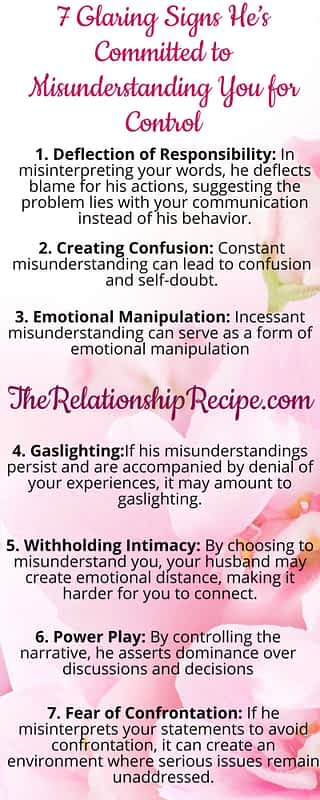7 Glaring Signs He’s Committed to Misunderstanding You for Control
I swear, it feels like one of us is speaking Greek to each other. Constantly.
Misunderstandings on a near daily basis are common in our relationship. Many times it leads to fights, and hurt feelings. He has an odd habit of answering questions that were never asked, because that is how he heard it. I have no idea why his inner filter does this, but it’s maddening and I wish it would stop.
I couldn’t figure out how he “hears” things that were never said. He seemed committed to misunderstanding me, and I couldn’t understand at the time that it’s a covert control tactic.
💡Key Highlights:
- Discover why his being committed to misunderstanding isn’t accidental
- Uncover how constant miscommunication can mask deeper control
- Learn the emotional costs of being misunderstood on purpose
- The subtle tactics that shift power in your relationship
- Find out when misunderstanding crosses the line and what to do next

One thing that never crossed my mind back then is how this can be a form of manipulation to give him the upper hand, control the narrative, and is absolutely intentional. Since I wasn’t seeing him as being manipulative at that time, it was so confusing because I couldn’t understand why he’d want to do that because this is some out of left field sh!t that I never even considered doing.
Controlling, yes – but being manipulative is something that I didn’t feel came naturally for him. Now I know the reason he intentionally misunderstood me comes from his innate for control…. and maybe a bit of cognitive bias.
I used to blame myself due to my adhd and the crazy way it affects love, and rejection sensitivity from it sure didn’t help anything.
I now see it as a form of crazy-making, as well which is a way to keep you off balance, and constantly questioning yourself. I also believe this is a by-product of toxic masculinity, since disrespect, being emotionally immature, and dismissiveness tends to go with the territory.

Why He’s Committed to Misunderstanding You: It’s Not by Accident
When it feels like your husband is committed to misunderstanding you, you’re not just dealing with poor communication; you’re stuck in an emotional tug-of-war you never signed up for, and it’s more than just a few crossed wires. This kind of constant miscommunication in your relationship isn’t random: it’s emotionally draining, maddening, and could be a subtle way to keep control. If you’re always being misunderstood on purpose, it might be time to stop blaming yourself and start asking what he’s really getting out of always “not getting it.”

✨Here’s what it could mean:
🚩Emotional Defensiveness: Sometimes, it’s not that he can’t understand you – it’s that he won’t. Emotionally defensive people have a habit of twisting words into weapons, especially when they feel even slightly criticized. Instead of owning their part or listening like a grown adult, they throw up walls and play the victim. So you end up being intentionally misunderstood, not because you’re unclear, but because it’s easier for him to deflect than to deal with what you’re actually saying.
🚩Unresolved Resentment: When your husband’s carrying around a suitcase full of resentment, don’t be surprised if he starts hearing what he wants instead of what you’re actually saying. Unresolved frustration has a sneaky way of showing up in conversations—especially when he’s not ready to deal with it. So instead of listening with empathy, he might intentionally misunderstand you, twisting your words just enough to avoid facing his own feelings. It’s not a communication glitch; it’s emotional avoidance dressed up as “you’re being too sensitive.”

🚩Power Struggles: being constantly, and likely intentionally misunderstood, isn’t just annoying – it can be a subtle power move. If he always seems confused by what you’re saying (but somehow never confused about what he wants), it’s not a coincidence. That whole “I don’t get what you mean” routine is often a quiet tactic to steer the conversation back to his comfort zone. By using constant miscommunication in your relationship, he keeps you explaining, backpedaling, and second-guessing – while his perspective stays front and center, unchallenged.
🚩Different Communication Styles: Obviously, not everyone speaks the same emotional language, but there’s a big difference between different communication styles and feeling like you’re being misunderstood on purpose. Maybe he processes emotions like a robot running Windows 95, while you’re over here trying to connect like an actual human. That mismatch can absolutely lead to confusion. But when it feels like constant misunderstanding in your relationship, like no matter how clearly you say it, he somehow still “doesn’t get it” it starts to feel less like miscommunication and more like emotional dodgeball.

🚩Emotional Disconnection: When the emotional intimacy fades, so does the effort. If your husband’s stopped trying to understand where you’re coming from, it might not be about what you’re saying; it might be about the fact that he’s emotionally checked out. And when someone no longer feels connected, they stop showing up. They stop trying. Suddenly, it’s easier for him to constantly misunderstand on purpose, than to meet you halfway. That disconnect is not just frustrating, it’s a flashing red flag that something deeper is slipping through the cracks.
🚩Lack of Empathy: If he always seems to miss the point, it might not be a listening problem, it might be a lack of emotional empathy. Some people just don’t have the bandwidth (or willingness) to actually engage with someone else’s feelings. Whether it’s emotional burnout, unresolved baggage, or straight-up narcissistic tendencies, the result’s the same: his emotions take center stage, and yours get sidelined. When someone is committed to misunderstanding you, it’s not what you’re saying – it’s what they’re refusing to feel.

🚩Avoidance of Deeper Issues: Sometimes, all that “I don’t get what you mean” energy is just a clever way to dodge the real conversation. If your husband is constantly misunderstanding you, it might not be confusion, but strategy. By fixating on the misunderstanding itself, he gets to avoid the bigger stuff: the emotional distance, the tension, the things neither of you really want to say out loud. It’s a stall tactic. If he’s always derailing the conversation, maybe it’s because he knows where it’s headed, and he doesn’t want to go there.
🚩Stress and Life Changes: Life gets messy, and stress can wreck your ability to actually listen, which may make you feel misunderstood on purpose since you can’t read the guy’s mind. If your husband’s juggling work drama, family chaos, or whatever else life’s throwing his way, his brain might be so cluttered he’s basically on autopilot. That means he’s not really hearing you; it’s more like background noise he’s barely processing. This kind of mental overload can make him twist your words or miss your point entirely. So, before you assume he’s just playing games, remember: sometimes, it’s less about control and more about a seriously distracted mind.
🚩Fear of Vulnerability: Getting real and emotional can freak some people out, especially if your husband’s scared of being vulnerable. When he feels threatened by your feelings, his go-to move might be to shut down or flip your words around like a defense shield. So instead of facing what’s really going on, he intentionally misunderstands you leading to constant miscommunication in your relationship, to keep his emotional armor intact. It’s not just frustrating – it’s a classic dodge to avoid the tough stuff both of you desperately need to unpack.

🚩Cognitive Bias: Everyone has cognitive biases that mess with how they take in information. If your husband already has preconceived ideas about your communication style or what you’re bringing up, he’ll unconsciously filter your words through that distorted lens. This kind of mental filter only makes the already constant miscommunication in your relationship worse, and it can easily lead to him being committed to misunderstanding you to control the narritive without even realizing it.
🚩Poor Listening Skills: Effective communication takes actual effort, and not everyone’s putting that in, which feels like you are being misunderstood on purpose. If your husband isn’t really listening, he’s not just missing your point—he’s missing you. When he’s too caught up in his own thoughts to tune in, it creates constant miscommunication in your relationship. And whether it’s from lack of practice or pure self-absorption, the end result is the same: he ends up committed to misunderstanding you, since thats easier than trying, one missed detail at a time.

Why His Being Committed to Misunderstanding You is Manipulative and Controlling
When a partner is misunderstanding you for control, it stops being innocent miscommunication and starts looking a lot like manipulation. Here’s how that plays out:
✔️Deflection of Responsibility:
If your husband constantly twists what you say, there’s a good chance he’s using it to dodge accountability. By intentionally misunderstanding your words, he gets to flip the script—suddenly, the problem isn’t his behavior, it’s your “poor communication.” It’s a convenient way to shift the focus and avoid owning up to his part, all while keeping you on the defensive.
✔️Creating Confusion:
When there’s constant miscommunication in your relationship, it doesn’t just lead to frustration—it messes with your head. Over time, being repeatedly misunderstood on purpose can leave you questioning your own thoughts, your words, even your reality. You start second-guessing yourself, wondering if maybe you did say it wrong (you probably didn’t.) But that kind of confusion chips away at your confidence and quietly shifts the power dynamic in his favor – until suddenly, you’re relying on his version of events instead of trusting your own.
✔️Emotional Manipulation:
When the constant miscommunication in your relationship never lets up, it stops being passive; it becomes emotional manipulation. If your husband reframes your concerns to make you look unreasonable or overly sensitive, that’s not miscommunication – that’s control. By misunderstanding you for control, he chips away at your emotional credibility, making you feel isolated, overreactive, or just plain “too much.” It’s a subtle but powerful way to dominate the emotional tone of the relationship, while leaving you feeling like the problem.
✔️Gaslighting:
If the constant misunderstanding comes with him denying your experiences, you’re not just dealing with poor communication anymore – you’re staring down gaslighting. This isn’t just frustrating; it’s psychological manipulation. When he insists your version of reality is wrong, your feelings are “dramatic,” or your memory is “off,” he’s chipping away at your trust in yourself. And if he’s committed to misunderstanding you on top of it, that’s not him being a “clueless husband” – it’s calculated. Over time, this kind of behavior can erode your confidence, your clarity, and your sense of who you are.

✔️Withholding Intimacy:
When your being misunderstood on purpose in day to day life, your husband isn’t just missing the point; he’s creating emotional distance on purpose. It’s a subtle but effective control tactic. The more he twists your words or plays the “I don’t get it” card, the less emotionally safe you feel expressing yourself. Over time, you stop sharing. You pull back. And just like that, he’s misunderstanding you for control, reinforcing the emotional power dynamic where he stays on top—and you’re stuck second-guessing whether opening up is even worth it.
✔️Power Play:
When misunderstandings become a regular occurrence, it can serve as a power play. By controlling the narrative, he asserts dominance over discussions and decisions, limiting your ability to voice concerns or influence the relationship’s direction. It’s a setup meant to keep you stuck. When they control the narrative and twist everything you say so it’s never “right” or good enough, they hold all the power. And the more powerless you start to feel, the more emotionally reactive you become, which just gives them more ammo to keep the cycle going. It’s exhausting, and it’s not by accident.
✔️Fear of Confrontation:
If he keeps “misinterpreting” your words every time things get uncomfortable, that’s not cluelessness, it’s avoidance with a purpose. By dodging real conversations, he gets to decide what’s worth talking about and what gets swept under the rug. And guess what? That leaves serious issues to rot in silence and resentment starts to creep in. It shuts down honest communication and quietly hands him control over the emotional script. He’s not just missing your point – he’s intentionally misunderstood you to steer the narrative.

Overcoming the Constant Miscommunication in Your Relationship
Dealing with someone who’s committed to misunderstanding you isn’t easy, but you’re not as powerless as he may like you to think. You can take clear, intentional steps to change this unhealthy dynamic, and protect your emotional clarity. Here’s how to stop spinning in circles when trying to deal with the emotional whiplash:
👉Establish Clear Communication: Be intentional about how you share your feelings and make your message clear and about you, not them. Swap out blame-heavy phrases like, “You never listen,” for something like, “I feel unheard when my concerns aren’t acknowledged.” Using “I” statements helps lower the defense shields and actually opens the door for real understanding instead of a fight.
👉Encourage Open Dialogue: Make a time for real talk, where both of you can lay your feelings on the table without judgment. Encourage him to open up and actually share what’s going on in his head. When things get fuzzy or you feel misunderstood, don’t let it slide. Ask questions to get to the real meaning. This kind of active listening cuts through his constant miscommunication in your relationship and starts building empathy instead.

👉Set Boundaries: When his commitment to misunderstanding turns into emotional manipulation, it’s time to draw the line. Be crystal clear about what behaviors won’t fly and how they impact you. Setting boundaries isn’t about starting a fight, it’s protecting yourself and pushing back against toxic patterns in your relationship. Being firm like this can shut down manipulation and demand the respect you deserve.
👉Seek Common Ground: Find the goals you both actually share and lean into them. When you focus on what you want together instead of what you’re fighting over, it shifts the energy from constant miscommunication, where you feel misunderstood on purpose, to real connection. This kind of commitment to mutual understanding helps close the gaps and rebuilds the bridge between you two.

👉Utilize Reflective Listening: Try reflective listening: repeat back what he’s said before jumping in with your response. This shows you’re actually paying attention and gives you both a chance to catch any mix-ups right then and there. It’s a simple way to cut down on the constant miscommunication in your relationship and keep the conversation on track.
👉Address Underlying Issues: A lot of misunderstandings actually come from emotional baggage that hasn’t been dealt with leading to another relationship issue – resentment. If you can, tackle those deeper issues together. This kind of commitment to facing what’s really going on can tighten your connection with each other and hopefully cut down on the endless feeling of being misunderstood on purpose.

Final Thoughts on Being Intentionally Misunderstood In Your Relationship
At some point, you have to ask yourself: when is enough, enough? If you’ve tried every angle like using clear communication, setting boundaries, and trying for mutual understanding, and he’s still committed to misunderstanding you, it’s not just frustrating; it’s a warning sign.
When your emotional needs are constantly dismissed, and the pattern shows no sign of changing, it’s okay to consider stepping away. Holding on to a relationship where you’re consistently misunderstood on purpose can wear down your sense of self. Sometimes, the healthiest move is to walk away and reclaim your peace. ✌️
This post may contain affiliate links. I earn from qualifying Amazon purchases at no extra cost to you. This content is for informational purposes only and is not a substitute for professional advice. Read full disclaimer.
Thank you for reading this post, don't forget to subscribe!







